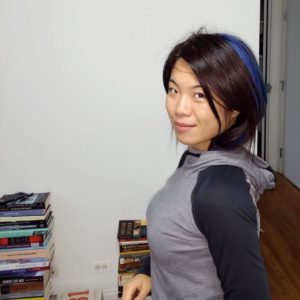Recipient Profile

E-mail: jli16@nd.edu
Language: Spanish
Location of Study: Mexico City, Mexico
Program of Study: CEPE, University Autonomous of Mexico
Sponsors: Center for the Study of Languages and Cultures, the College of Arts and Letters, and Kellogg Institute For International Studies
Blog URL: http://sites.nd.edu/sla2019/author/jli16/
Pre-departure
A brief personal bio:
I am a first-year PhD Sociology student at the University of Notre Dame. My research interests are in Chinese investment in Latin America. I am originally from China and have studied and worked in the U.S. for over ten years. Prior to coming to Notre Dame, I got my Master in Public Policy at the Johns Hopkins University and worked as a policy analyst in Baltimore, Maryland. I enjoy reading, rock climbing, playing basketball and trying out new food. Fascinated by Latin American history and culture, I would love to understand Latin American people’s perspectives on cross-national flows of people and money from China, and how this interaction between China and Latin America could contribute to a more prosperous and equal global future.
Why this summer language abroad opportunity is important to me:
My SLA grant is important to me because of my research interest on Chinese investment in Latin America and my fascination with Latin American history and culture. With Chinese investment in Latin America sky-rocketing since 2010, few scholars have systematically researched this phenomenon. This summer, thanks to the SLA language grant, I can hone my Spanish skills and leverage this language skills to immerse myself in Latin American culture. This interaction between China and Latin America is not only important to economic development, but also for environmental and labor rights protection. Mexico is an interesting and representative case in my research. How Chinese investment has interacted with the Mexican manufacturing industry is illustrative of the impacts of globalization on local communities. While in Mexico, I would love to do some field research alongside my language studies, so that we could understand better the conditions under which globalization could be leveraged to deliver economic growth to local communities, and its negative impacts could be mitigated or prevented.
What I hope to achieve as a result of this summer study abroad experience:
My first priority is to hone my Spanish language skills. I have been learning the language on and off for several years. As I delve into my research in-depth, I would love to be able to interview the Mexican public on their perspectives on Chinese investment, such as shop-floor Mexican workers, housewives, school children and etc. This summer, I hope to develop an intermediate conversational skills to facilitate my qualitative processes in the near future. I need to be able to communicate effectively with the average citizen. My side project for the summer is to conduct field research for my master’s thesis. I plan to utilize the summer opportunity in Mexico City to interview academic experts who have studied Chinese investment, policy-makers who participated in negotiation processes, and business leaders who could provide practical insights. Ideally, I could make significant progress on my language skills, then I could move on to interview average citizens as discussed in the above paragraphs. Additionally, I would love to invest a significant amount of my leisure time to absorb as much Mexican history and culture as possible. Mexico City is the economic and cultural center of Central America. The vast educational resources in museums, universities and civic organizations are not to be missed.
My specific learning goals for language and intercultural learning this summer:
1. At the end of the summer, I will be able to communicate in Spanish with native speakers on academic, economic and political topics such as globalization, economic changes, and elections.
2. At the end of the summer, I will develop the linguistic and cultural sensitivity to further educate myself on the language, culture and history of Latin American countries.
3. At the end of the summer, I will be able to describe the major structures and themes of the Mexican state and explain how these parallel and diverge from political structures in other Latin American countries. This knowledge would greatly inform my research on how Chinese investment navigates business environments in different contexts.